Han Thuyen group and marxist model in Vietnam during the period 1940-1945
In the 40s of the 20th century, Han Thuyen group gained a large social influence
by introduction of many publications with innovative ideology. With the mentioned
historical meaning, we study Han Thuyen group as a typical example for adoption of
Marxist model in Vietnam in the 40s. However, studying all authors of Han Thuyen group
to clarify cultural influence of Marxist ideology is a very large topic. Within available
ability, in this article, we only study some works of Truong Tuu – the soul and the editor of
the group, and another author - Luong Duc Thiep to understand that model. This is the
premise to explain the formation, acculturation and exchange of Vietnamese culture from
the 20th century to the 21st century.
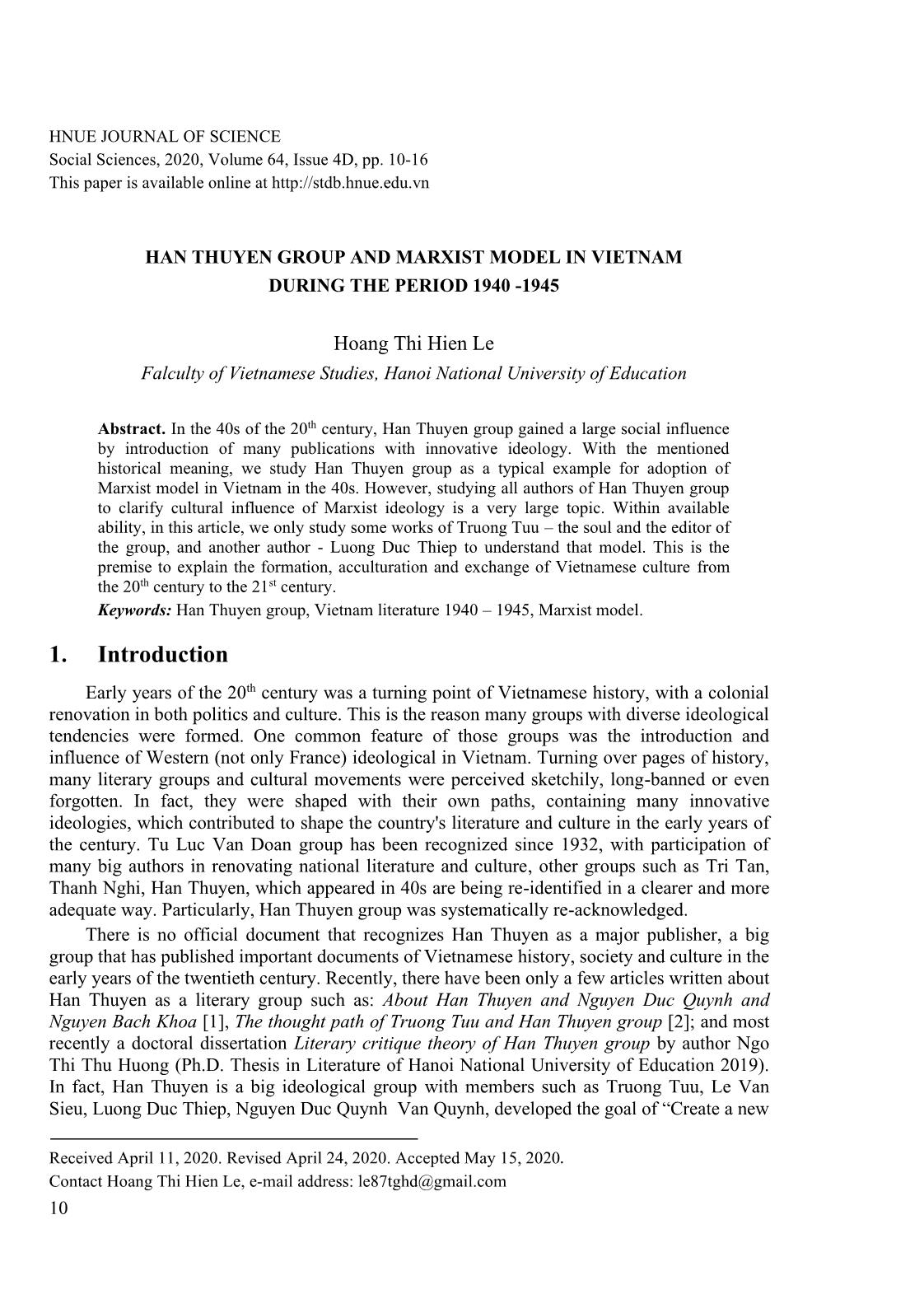
Trang 1
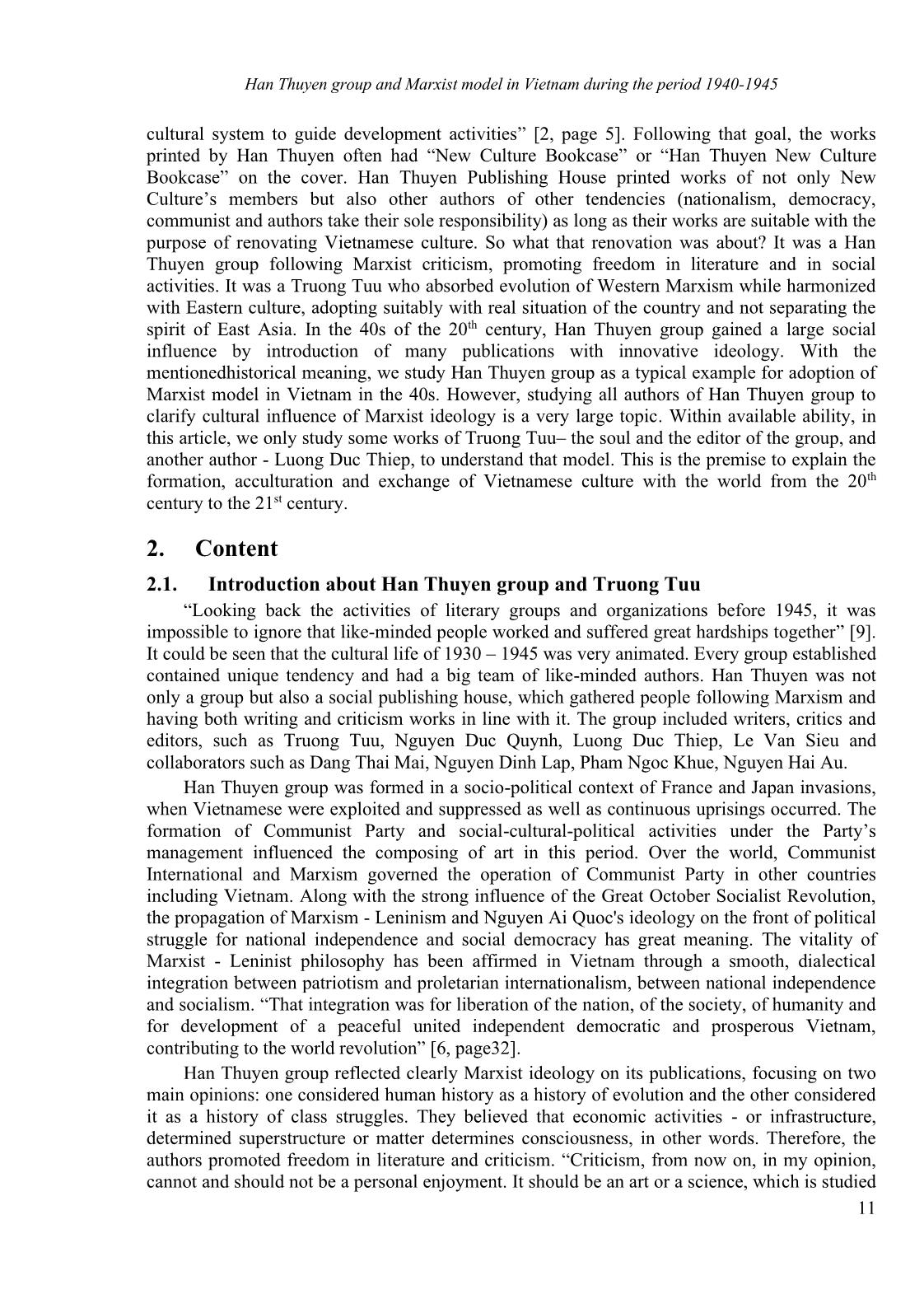
Trang 2
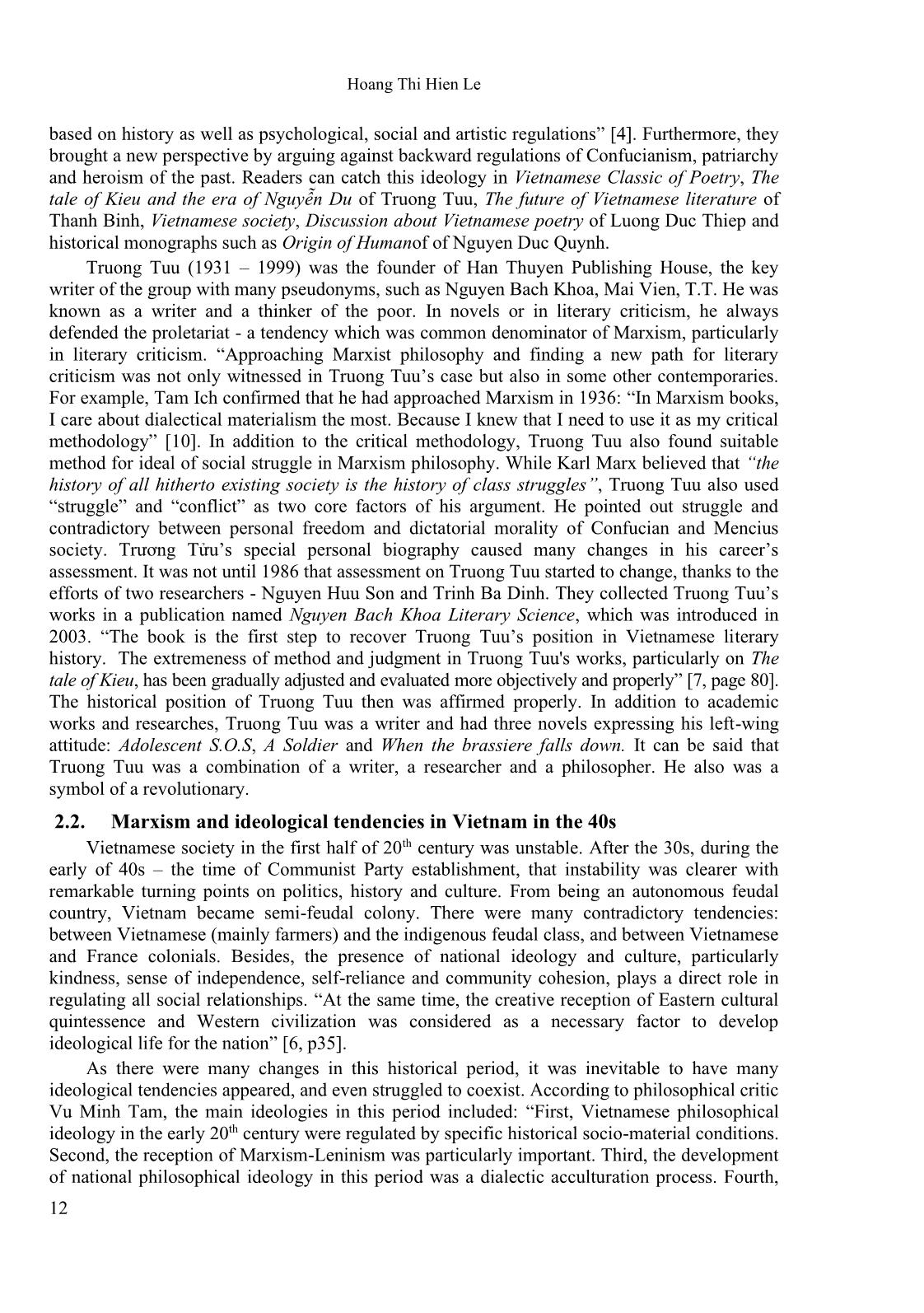
Trang 3
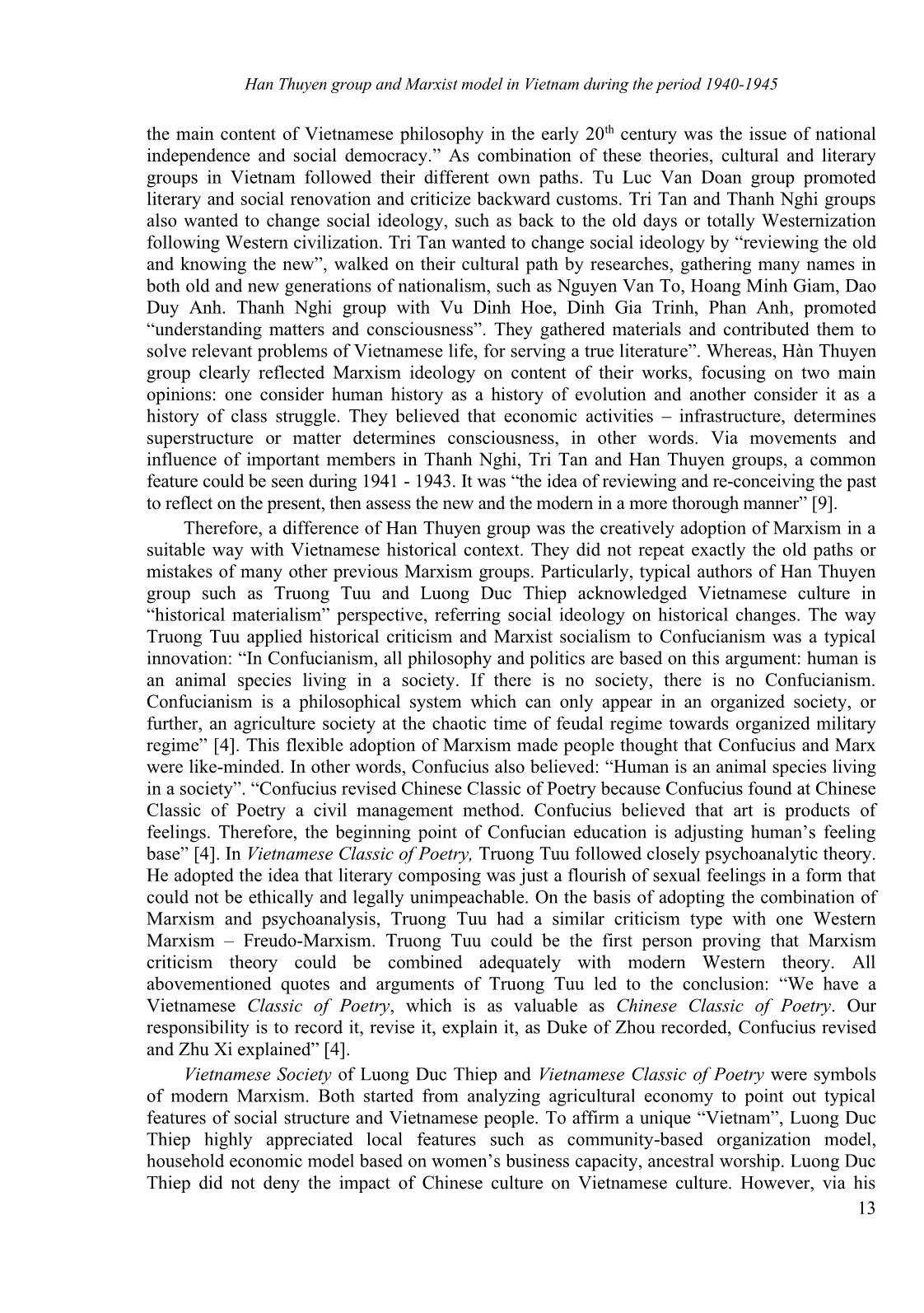
Trang 4
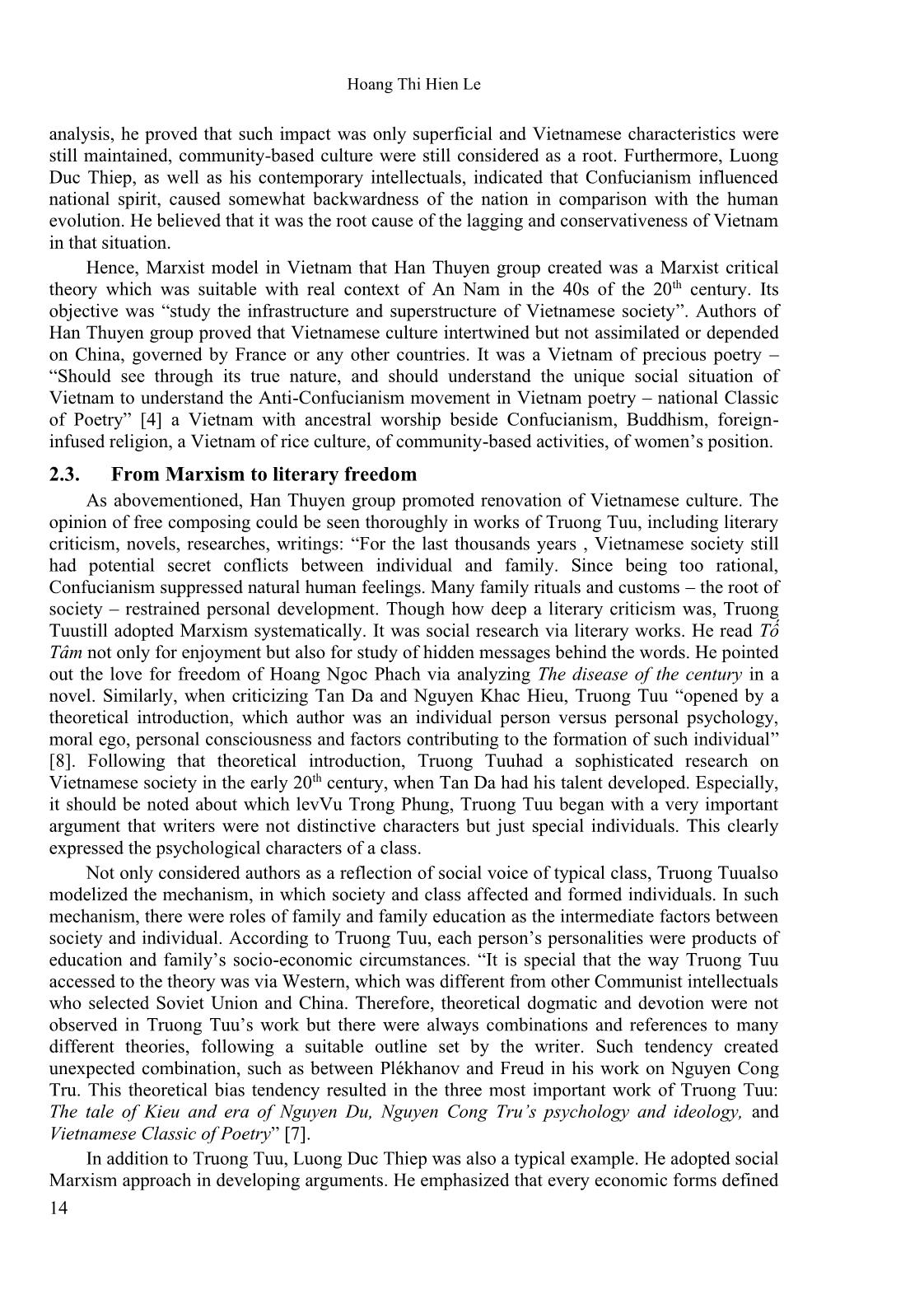
Trang 5
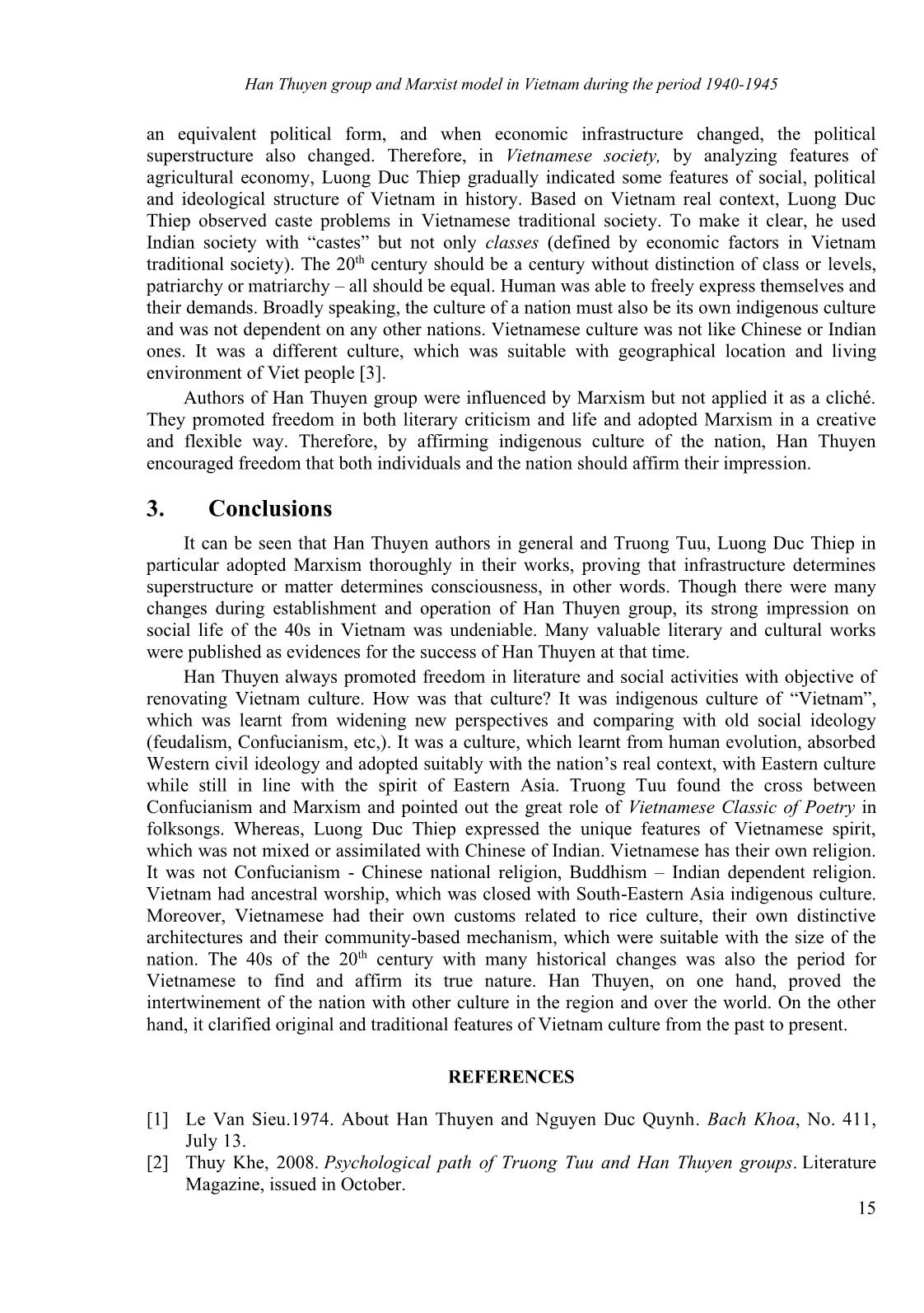
Trang 6
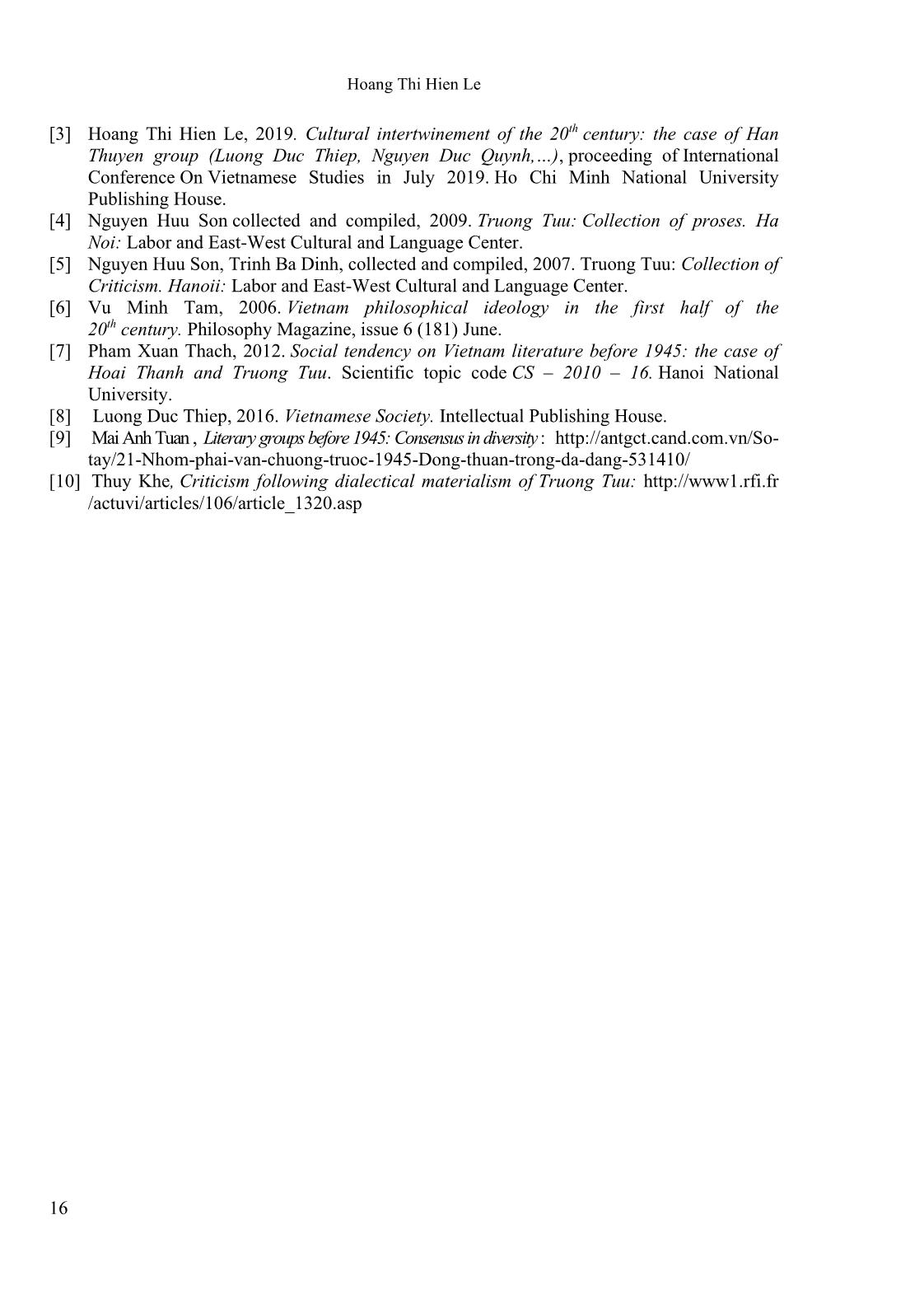
Trang 7
Tóm tắt nội dung tài liệu: Han Thuyen group and marxist model in Vietnam during the period 1940-1945
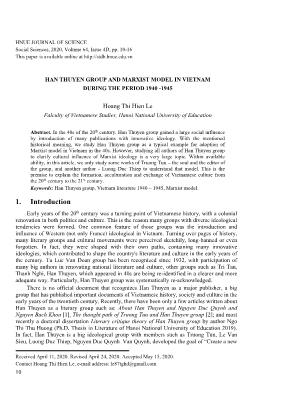
and France colonials. Besides, the presence of national ideology and culture, particularly kindness, sense of independence, self-reliance and community cohesion, plays a direct role in regulating all social relationships. “At the same time, the creative reception of Eastern cultural quintessence and Western civilization was considered as a necessary factor to develop ideological life for the nation” [6, p35]. As there were many changes in this historical period, it was inevitable to have many ideological tendencies appeared, and even struggled to coexist. According to philosophical critic Vu Minh Tam, the main ideologies in this period included: “First, Vietnamese philosophical ideology in the early 20th century were regulated by specific historical socio-material conditions. Second, the reception of Marxism-Leninism was particularly important. Third, the development of national philosophical ideology in this period was a dialectic acculturation process. Fourth, Han Thuyen group and Marxist model in Vietnam during the period 1940-1945 13 the main content of Vietnamese philosophy in the early 20th century was the issue of national independence and social democracy.” As combination of these theories, cultural and literary groups in Vietnam followed their different own paths. Tu Luc Van Doan group promoted literary and social renovation and criticize backward customs. Tri Tan and Thanh Nghi groups also wanted to change social ideology, such as back to the old days or totally Westernization following Western civilization. Tri Tan wanted to change social ideology by “reviewing the old and knowing the new”, walked on their cultural path by researches, gathering many names in both old and new generations of nationalism, such as Nguyen Van To, Hoang Minh Giam, Dao Duy Anh. Thanh Nghi group with Vu Dinh Hoe, Dinh Gia Trinh, Phan Anh, promoted “understanding matters and consciousness”. They gathered materials and contributed them to solve relevant problems of Vietnamese life, for serving a true literature”. Whereas, Hàn Thuyen group clearly reflected Marxism ideology on content of their works, focusing on two main opinions: one consider human history as a history of evolution and another consider it as a history of class struggle. They believed that economic activities – infrastructure, determines superstructure or matter determines consciousness, in other words. Via movements and influence of important members in Thanh Nghi, Tri Tan and Han Thuyen groups, a common feature could be seen during 1941 - 1943. It was “the idea of reviewing and re-conceiving the past to reflect on the present, then assess the new and the modern in a more thorough manner” [9]. Therefore, a difference of Han Thuyen group was the creatively adoption of Marxism in a suitable way with Vietnamese historical context. They did not repeat exactly the old paths or mistakes of many other previous Marxism groups. Particularly, typical authors of Han Thuyen group such as Truong Tuu and Luong Duc Thiep acknowledged Vietnamese culture in “historical materialism” perspective, referring social ideology on historical changes. The way Truong Tuu applied historical criticism and Marxist socialism to Confucianism was a typical innovation: “In Confucianism, all philosophy and politics are based on this argument: human is an animal species living in a society. If there is no society, there is no Confucianism. Confucianism is a philosophical system which can only appear in an organized society, or further, an agriculture society at the chaotic time of feudal regime towards organized military regime” [4]. This flexible adoption of Marxism made people thought that Confucius and Marx were like-minded. In other words, Confucius also believed: “Human is an animal species living in a society”. “Confucius revised Chinese Classic of Poetry because Confucius found at Chinese Classic of Poetry a civil management method. Confucius believed that art is products of feelings. Therefore, the beginning point of Confucian education is adjusting human’s feeling base” [4]. In Vietnamese Classic of Poetry, Truong Tuu followed closely psychoanalytic theory. He adopted the idea that literary composing was just a flourish of sexual feelings in a form that could not be ethically and legally unimpeachable. On the basis of adopting the combination of Marxism and psychoanalysis, Truong Tuu had a similar criticism type with one Western Marxism – Freudo-Marxism. Truong Tuu could be the first person proving that Marxism criticism theory could be combined adequately with modern Western theory. All abovementioned quotes and arguments of Truong Tuu led to the conclusion: “We have a Vietnamese Classic of Poetry, which is as valuable as Chinese Classic of Poetry. Our responsibility is to record it, revise it, explain it, as Duke of Zhou recorded, Confucius revised and Zhu Xi explained” [4]. Vietnamese Society of Luong Duc Thiep and Vietnamese Classic of Poetry were symbols of modern Marxism. Both started from analyzing agricultural economy to point out typical features of social structure and Vietnamese people. To affirm a unique “Vietnam”, Luong Duc Thiep highly appreciated local features such as community-based organization model, household economic model based on women’s business capacity, ancestral worship. Luong Duc Thiep did not deny the impact of Chinese culture on Vietnamese culture. However, via his Hoang Thi Hien Le 14 analysis, he proved that such impact was only superficial and Vietnamese characteristics were still maintained, community-based culture were still considered as a root. Furthermore, Luong Duc Thiep, as well as his contemporary intellectuals, indicated that Confucianism influenced national spirit, caused somewhat backwardness of the nation in comparison with the human evolution. He believed that it was the root cause of the lagging and conservativeness of Vietnam in that situation. Hence, Marxist model in Vietnam that Han Thuyen group created was a Marxist critical theory which was suitable with real context of An Nam in the 40s of the 20th century. Its objective was “study the infrastructure and superstructure of Vietnamese society”. Authors of Han Thuyen group proved that Vietnamese culture intertwined but not assimilated or depended on China, governed by France or any other countries. It was a Vietnam of precious poetry – “Should see through its true nature, and should understand the unique social situation of Vietnam to understand the Anti-Confucianism movement in Vietnam poetry – national Classic of Poetry” [4] a Vietnam with ancestral worship beside Confucianism, Buddhism, foreign- infused religion, a Vietnam of rice culture, of community-based activities, of women’s position. 2.3. From Marxism to literary freedom As abovementioned, Han Thuyen group promoted renovation of Vietnamese culture. The opinion of free composing could be seen thoroughly in works of Truong Tuu, including literary criticism, novels, researches, writings: “For the last thousands years , Vietnamese society still had potential secret conflicts between individual and family. Since being too rational, Confucianism suppressed natural human feelings. Many family rituals and customs – the root of society – restrained personal development. Though how deep a literary criticism was, Truong Tuustill adopted Marxism systematically. It was social research via literary works. He read Tố Tâm not only for enjoyment but also for study of hidden messages behind the words. He pointed out the love for freedom of Hoang Ngoc Phach via analyzing The disease of the century in a novel. Similarly, when criticizing Tan Da and Nguyen Khac Hieu, Truong Tuu “opened by a theoretical introduction, which author was an individual person versus personal psychology, moral ego, personal consciousness and factors contributing to the formation of such individual” [8]. Following that theoretical introduction, Truong Tuuhad a sophisticated research on Vietnamese society in the early 20th century, when Tan Da had his talent developed. Especially, it should be noted about which levVu Trong Phung, Truong Tuu began with a very important argument that writers were not distinctive characters but just special individuals. This clearly expressed the psychological characters of a class. Not only considered authors as a reflection of social voice of typical class, Truong Tuualso modelized the mechanism, in which society and class affected and formed individuals. In such mechanism, there were roles of family and family education as the intermediate factors between society and individual. According to Truong Tuu, each person’s personalities were products of education and family’s socio-economic circumstances. “It is special that the way Truong Tuu accessed to the theory was via Western, which was different from other Communist intellectuals who selected Soviet Union and China. Therefore, theoretical dogmatic and devotion were not observed in Truong Tuu’s work but there were always combinations and references to many different theories, following a suitable outline set by the writer. Such tendency created unexpected combination, such as between Plékhanov and Freud in his work on Nguyen Cong Tru. This theoretical bias tendency resulted in the three most important work of Truong Tuu: The tale of Kieu and era of Nguyen Du, Nguyen Cong Tru’s psychology and ideology, and Vietnamese Classic of Poetry” [7]. In addition to Truong Tuu, Luong Duc Thiep was also a typical example. He adopted social Marxism approach in developing arguments. He emphasized that every economic forms defined Han Thuyen group and Marxist model in Vietnam during the period 1940-1945 15 an equivalent political form, and when economic infrastructure changed, the political superstructure also changed. Therefore, in Vietnamese society, by analyzing features of agricultural economy, Luong Duc Thiep gradually indicated some features of social, political and ideological structure of Vietnam in history. Based on Vietnam real context, Luong Duc Thiep observed caste problems in Vietnamese traditional society. To make it clear, he used Indian society with “castes” but not only classes (defined by economic factors in Vietnam traditional society). The 20th century should be a century without distinction of class or levels, patriarchy or matriarchy – all should be equal. Human was able to freely express themselves and their demands. Broadly speaking, the culture of a nation must also be its own indigenous culture and was not dependent on any other nations. Vietnamese culture was not like Chinese or Indian ones. It was a different culture, which was suitable with geographical location and living environment of Viet people [3]. Authors of Han Thuyen group were influenced by Marxism but not applied it as a cliché. They promoted freedom in both literary criticism and life and adopted Marxism in a creative and flexible way. Therefore, by affirming indigenous culture of the nation, Han Thuyen encouraged freedom that both individuals and the nation should affirm their impression. 3. Conclusions It can be seen that Han Thuyen authors in general and Truong Tuu, Luong Duc Thiep in particular adopted Marxism thoroughly in their works, proving that infrastructure determines superstructure or matter determines consciousness, in other words. Though there were many changes during establishment and operation of Han Thuyen group, its strong impression on social life of the 40s in Vietnam was undeniable. Many valuable literary and cultural works were published as evidences for the success of Han Thuyen at that time. Han Thuyen always promoted freedom in literature and social activities with objective of renovating Vietnam culture. How was that culture? It was indigenous culture of “Vietnam”, which was learnt from widening new perspectives and comparing with old social ideology (feudalism, Confucianism, etc,). It was a culture, which learnt from human evolution, absorbed Western civil ideology and adopted suitably with the nation’s real context, with Eastern culture while still in line with the spirit of Eastern Asia. Truong Tuu found the cross between Confucianism and Marxism and pointed out the great role of Vietnamese Classic of Poetry in folksongs. Whereas, Luong Duc Thiep expressed the unique features of Vietnamese spirit, which was not mixed or assimilated with Chinese of Indian. Vietnamese has their own religion. It was not Confucianism - Chinese national religion, Buddhism – Indian dependent religion. Vietnam had ancestral worship, which was closed with South-Eastern Asia indigenous culture. Moreover, Vietnamese had their own customs related to rice culture, their own distinctive architectures and their community-based mechanism, which were suitable with the size of the nation. The 40s of the 20th century with many historical changes was also the period for Vietnamese to find and affirm its true nature. Han Thuyen, on one hand, proved the intertwinement of the nation with other culture in the region and over the world. On the other hand, it clarified original and traditional features of Vietnam culture from the past to present. REFERENCES [1] Le Van Sieu.1974. About Han Thuyen and Nguyen Duc Quynh. Bach Khoa, No. 411, July 13. [2] Thuy Khe, 2008. Psychological path of Truong Tuu and Han Thuyen groups. Literature Magazine, issued in October. Hoang Thi Hien Le 16 [3] Hoang Thi Hien Le, 2019. Cultural intertwinement of the 20th century: the case of Han Thuyen group (Luong Duc Thiep, Nguyen Duc Quynh,), proceeding of International Conference On Vietnamese Studies in July 2019. Ho Chi Minh National University Publishing House. [4] Nguyen Huu Son collected and compiled, 2009. Truong Tuu: Collection of proses. Ha Noi: Labor and East-West Cultural and Language Center. [5] Nguyen Huu Son, Trinh Ba Dinh, collected and compiled, 2007. Truong Tuu: Collection of Criticism. Hanoii: Labor and East-West Cultural and Language Center. [6] Vu Minh Tam, 2006. Vietnam philosophical ideology in the first half of the 20th century. Philosophy Magazine, issue 6 (181) June. [7] Pham Xuan Thach, 2012. Social tendency on Vietnam literature before 1945: the case of Hoai Thanh and Truong Tuu. Scientific topic code CS – 2010 – 16. Hanoi National University. [8] Luong Duc Thiep, 2016. Vietnamese Society. Intellectual Publishing House. [9] Mai Anh Tuan , Literary groups before 1945: Consensus in diversity : tay/21-Nhom-phai-van-chuong-truoc-1945-Dong-thuan-trong-da-dang-531410/ [10] Thuy Khe, Criticism following dialectical materialism of Truong Tuu: /actuvi/articles/106/article_1320.asp
File đính kèm:
 han_thuyen_group_and_marxist_model_in_vietnam_during_the_per.pdf
han_thuyen_group_and_marxist_model_in_vietnam_during_the_per.pdf

